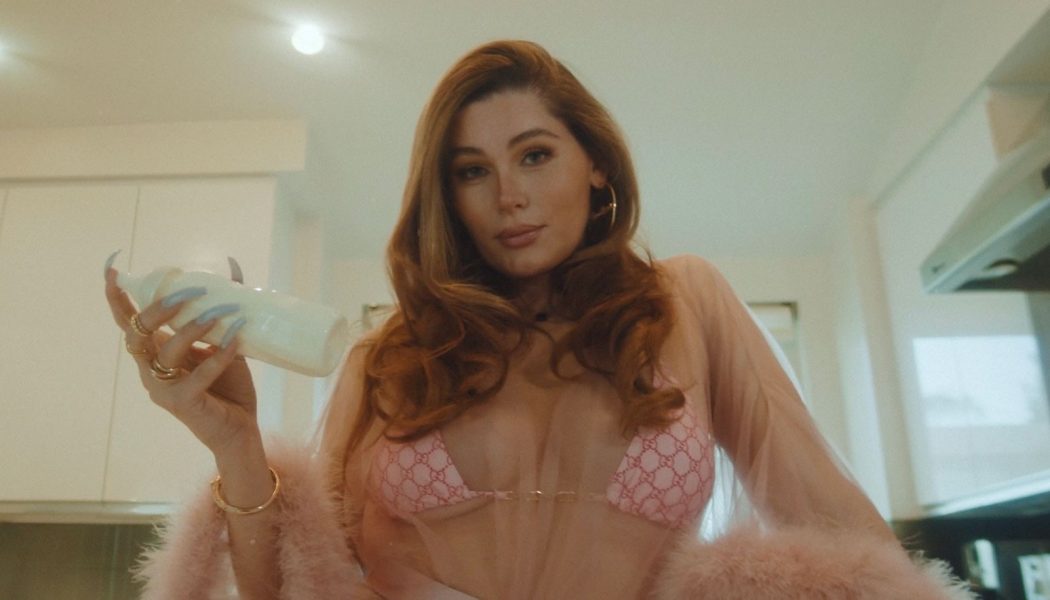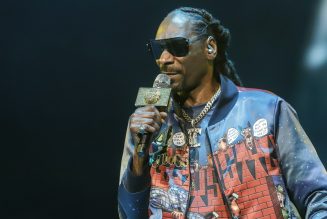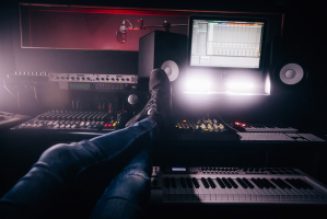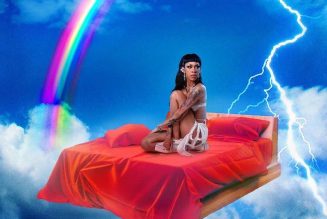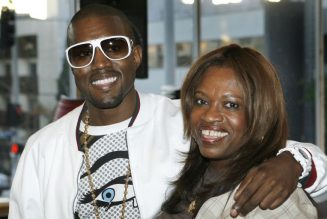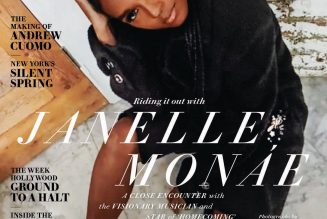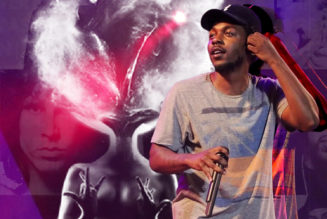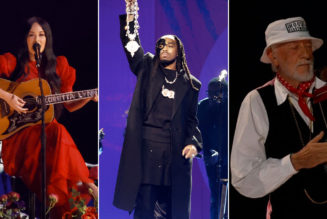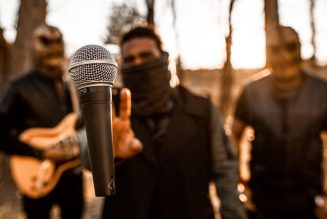
What made you want to get into music with “SMB”?
In this business, we’re constantly evolving and showing the world more layers of who we are. I think that’s always a struggle with talent: this relationship of trying to figure out how to present your most authentic self to the world, and hopefully be loved for it. I grew up on hip-hop, had Lil’ Kim and Foxy Brown plastered on my walls as an adolescent, and I always wanted to dive into that space. Acting can be so limiting, especially as a trans actor. You just get what’s thrown at you, and a lot of times, it’s crumbs. I needed another outlet for my artistry.
I really wanted the song to have a message. Sometimes I feel like it might be going over people’s heads, cis people’s heads. Maybe they don’t quite get the meaning of being a self-made bitch. When a trans woman is saying the lyrics, “I’m not your appetizer, I’m the lasagna,” it’s like, “I’m tired of being your little morsel, your little snack, your hidden fetish. I’m actually the whole meal.” And I’m Italian! [Laughs.] There were so many meanings in every little lyric. I wrote it for my girls, for my trans sisters.
When did you first start rapping? This doesn’t sound like your first time.
I was able to tap my friend Devere Rogers to help with the song structure and co-write, but I’ve been rapping for over 10 years. I’ve just never published anything. I have poems and raps that I wrote way back when I was living in East Harlem that have never seen the light of day. I don’t remember where I learned to flow, it was just as a preteen listening to Kim and Missy and Foxy, up in my bedroom living the fantasy with them. I remember my mother coming home from work one day — I can’t believe I’m telling this story — and I had my little briefs on, wedged up in my ass in the living room, rapping along to Lil’ Kim. [Laughs.] She came in like, “What is going on up in here?” That was a moment we had to have a chat. It’s been a journey.
How did you figure out what your sound was?
I didn’t have the luxury of going through a lot of beats. The producer who made the beat, he sent me two or three options, and I picked the one I felt most comfortable with. Hopefully as my musical journey moves on, I’ll be able to branch out. I’ve had a few people send me beat packs since “SMB” came out, so I’m looking forward to going through those folders and finding something that resonates with me. I wanted people to feel it. Music is so vulnerable compared to acting — you’re playing a character, but when you’re doing music, it’s you. This was me shedding another layer and sharing another side of Trace, probably a truer side of Trace that I’ve wanted to share for a while.
There is not an abundance of trans representation in the music industry, especially in hip-hop, so a song like “SMB” is really exciting. At the same time, being self-made, coming from nothing and building something for yourself, especially when it feels like the world is stacked against you — those are some classic hip-hop themes. Is there some power in the fact that, in a way, there is already room for your story in the genre?
Yeah. Hip-hop comes from pain, it comes from struggle, and I’ve had more than my fair share of that as a trans woman. I know my trans sisters have, too. I think the challenge is getting the mainstream to pay attention and give us that validity we’re searching for — even if it’s just playlisting on a normal hip-hop playlist on Spotify, which I couldn’t make happen. I ended up on these LGBTQ playlists, which is fine, but this is a rap song at its core. This is what hip-hop is about. It’s about coming from nothing, it’s about the journey, it’s about pain, it’s about being self-made. I think the challenge is getting society and mainstream hip-hop heads to really see LGBTQ hip-hop artists as part of the fold. Usher us in. Give us our props. And I hope it resonates with people outside of being LGBTQ or trans. It was meant to be a feminist anthem, or for anybody that identifies as being self-made.
Have you heard from those hip-hop heads since you put it out? What has the reaction been like?
I did get a nod of approval from some of my platonic straight cis male friends in the hip-hop world. They were like, “OK, that flow is nasty! Keep doing it, sis!” I felt really good about that. Cis women go through a lot trying to navigate that very male-dominated space. So as a trans woman and a white trans woman, I know I’m this foreign entity here. But I have to be true to me and my voice. For the most part it was really well-received, and I’m just glad that it opened that door for me. It’s diversified who I am as an artist — I don’t have to be just an actress.
Does seeing so many women in rap right now collaborate with each other and lift each other up encourage you as you enter this space?
Oh, absolutely. We saw a glimmer of it back in the ‘90s with Missy and Lil’ Kim and Da Brat. There were some women collaborating back then. But then there was always this push of cattiness from outside forces that pitted them up against each other. I always hated that. I’m not like that with my life. I love celebrating other women and their wins. So it’s been nice to see all the collaborations with Doja Cat and Saweetie and Megan Thee Stallion. Seeing that happen now it’s like, yeah, girl power, let’s do this! I’m hoping after I get a few more songs out there that I can get some collaborations going on.
My favorite hip-hop artists are all women, and I was talking about that with Lizzo in an interview a few years ago. She said something that really struck me: That men rap about the power they have, and women rap about power they’re trying to take. And that’s why it connects differently for some people.
Yeah, I listen to a small amount of male rappers — I like a little Slum Village and Common — but the majority of hip-hop I listen to is women. And it always has been. Salt-N-Pepa’s “Push It” was the first song that I remember hearing and really resonating with. I ran into my sister’s room — she had this pink boom box and had taped it off the radio — and we were listening to it over and over. It was this special moment of femininity and taking your power. And that just resonated with me as somebody who was trying to figure out my gender. Hearing these women speak in an empowered way about taking up space, or owning their bodies in Lil’ Kim’s case, it was everything for me. When I hear some men spit, talking about how they have this or that, it’s like, well, you’re a man! You’re not really saying nothing! Of course you got that position. But women are out here fighting for it.
I want to ask you about something you tweeted the other day: You referenced a conversation you had in a bar with Dave Chappelle about trans jokes in which he said he’d stop making them. I’d love to know more about that conversation and how you got through to him if you feel comfortable telling the story.
I don’t want to make it a big stink, because we did have a good ending. We had a drink after. It was a conversation that just happened organically. He came over, and his special came up. He asked if I’d watched it. I was just like, “Nah, I’m still licking my wounds from your last one, Dave. I haven’t seen your new special.” This sparked this whole conversation about oppression and people policing his voice — that’s how he viewed it, and I understand that. At the same time, when comedians talk about trans women, [I want them] to understand the connection that talking about us in a joking manner has to the violence that is inflicted upon us in our everyday lives.
The conversation was so layered. Maybe he assumed that I navigate the world as a white woman, and I do — but I’m an out proud trans woman, and the trauma I experienced transitioning in Brooklyn before I was “passable” has never left me: the physical violence, the verbal violence, the fist fights I experienced growing up. I’ve literally been fighting for my life all through elementary school, high school and beyond into adulthood. And obviously it’s compounded for our black trans sisters.
The biggest thing that I want comedians to understand is that there are so many other sources for your comedy. There’s a clip of George Carlin on YouTube that someone sent me where he articulates what it says about a particular person who feels the need to source their comedy by picking on the underdog. Maybe it doesn’t connect for some comedians that we’re the underdogs, but let me tell you: We are! I think all marginalized folks need to stick together. Whatever your marginalized identity is, we gotta get connected in our alliance.
I think that’s where we ended up. He was like, “You know what, you don’t want me talking about you, I won’t talk about y’all no more!” And then he was like, “Do you wanna come have a drink with me?” I was like, “Cool!” It ended chill. I hope it doesn’t turn into something [on the Internet] now because this was 2019. But he seemed like a good guy with a good heart. He’s a comedic legend. It was just something that happened, and we were able to meet in the middle. It ended on a good note.
You executive produced the docuseries Trans in Trumpland, which comes to streaming later this month, and also appear in the Netflix documentary Disclosure: Trans Lives on Screen, which has gotten awards-show buzz and also lit up social media — especially with that great clip of Jen Richards talking about cis actors playing trans roles. What’s it like seeing these projects reach people — even people who think they’re well-informed — and change perceptions in the way that they have?
I knew Disclosure was going to make a difference when I saw the final edit. I was in their pre-interviews before [the filmmakers] applied to get their grant, and then we went and reshot them, so it’s been years in the making. And then when I saw it at Sundance and there was a five-minute standing ovation, I knew it was going to have an impact.
But I didn’t anticipate the amount of tweets that followed, seeing Ryan Reynolds speak about it and all these other A-listers that tweeted about it. It let me know, “OK, maybe Hollywood is listening.” Because trans people, we’re constantly doing the work of uncovering the history that has been erased. We’ve been here for a very long time, but we talk about it like it’s this new movement. And it’s not. I talk to my trans mother, my trans aunties in their 50s and 60s and 70s, and the things they endured back in the day? It feels unreal to see this global conversation finally. At the same time, it’s really overdue.
I do think that it’s going to be important for years to come. Universities and schools are showing it or talking about showing it in their curriculums. It’s a tool that we can now use whenever we’re going to make some content: Please watch this before we collaborate together. That way I don’t have to over-explain or do the Trans 101 with you about where we’re at and what we need to say. We don’t have time for that no more! It’s time to move on and get into all the different stories. A lot of us are waiting to see our journey on television or in movies. We’ve had a few successes, but no trans story is the same.
Let’s end on a fun note: Were there a hypothetical Hustlers 2, what would you want to see for your character?
Wow, if I had to pitch that, I’d say maybe Tracey comes back as the kind of O.G. of the club in the way that Ramona [played by Jennifer Lopez] was? Maybe it’s about some of the girls getting out of the life or opening a club of their own. There are so many ways it could go! Hustlers 2 would be a dream. I adore [director] Lorene Scafaria. She’s a friend of mine now after that project. If it’s in the cards, I’m completely down.
